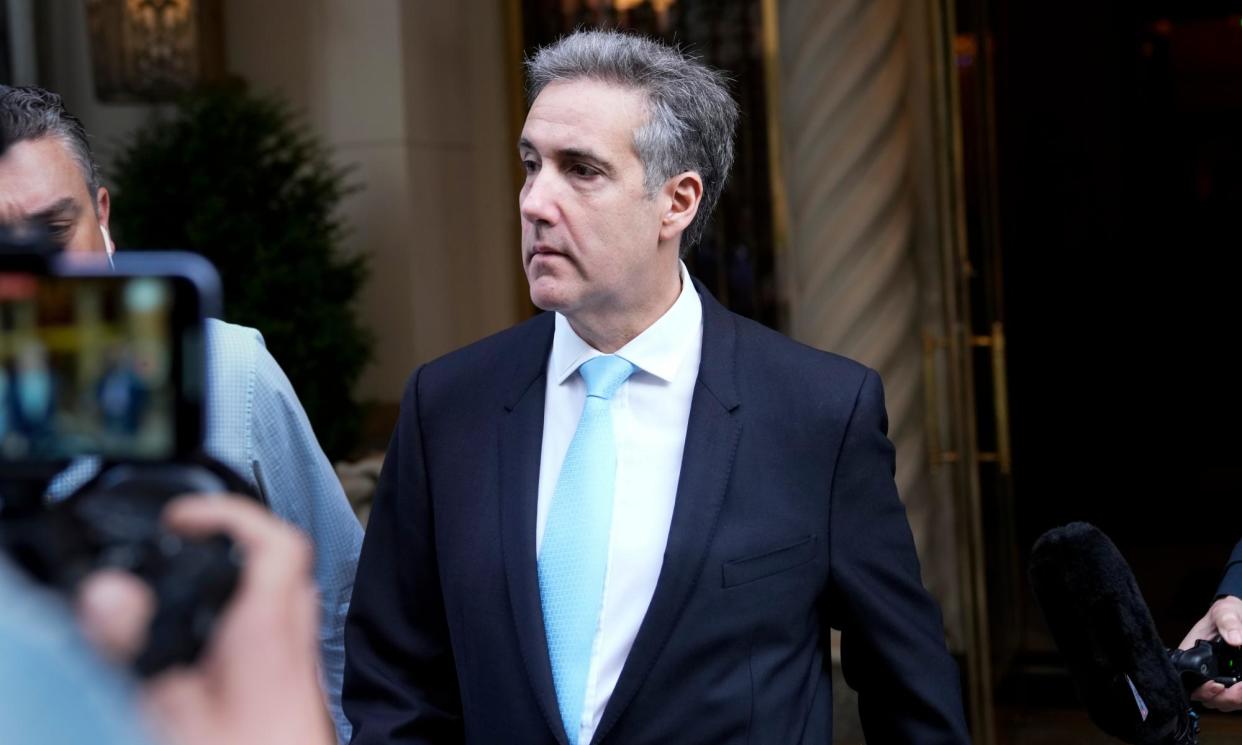Michael Cohen tells hush-money jury of phoney invoices to cover up payment

Donald Trump’s ex-lawyer Michael Cohen testified in Manhattan court on Tuesday that he submitted phoney invoices for legal services to cover up what were, in fact, reimbursements for a $130,000 hush-money payment to the adult film actor Stormy Daniels on his then boss’s behalf.
He repeatedly identified Trump as the driver of the Daniels payoff scheme – and said that he did it to protect Trump from losing the election. Cohen said he got the money to Daniels “to ensure that the story would not come out, would not affect Mr Trump’s chances of becoming president of the United States”.
“At whose direction, and on whose behalf, did you commit that crime?” prosecutor Susan Hoffinger asked him.
“On behalf of Mr Trump”, Cohen said.
In stunningly matter-of-fact testimony, Cohen also told jurors that these repayments began shortly after an 8 February 2017 meeting with Trump in the Oval Office, where they discussed money. Cohen testified that he had yet to be repaid for his payment to Daniels when this meeting occurred.
“So, I was sitting with President Trump and he asked me if I was OK, he asked me if I needed money, and I said: ‘No, all good,’” Cohen recalled. “He said, ‘All right, just make sure you deal with Allen.’”
Allen referred to Allen Weisselberg, the Trump Organization’s chief financial officer at the time, who was recently jailed for lying at his former boss’s civil fraud trial. Weisselberg had previously pleaded guilty in fall 2022 to tax crimes, for which he was also jailed.
“Did you take any photos commemorating your visit?” Hoffinger asked.
“I did,” Cohen said.
Hoffinger displayed a photo of Cohen, smiling, at the lectern in the White House briefing room from that date.
The prosecutor asked why.
“I was in the White House,” Cohen said.
Hoffinger showed an email, from Cohen to the then Trump Organization controller, Jeffrey McConney, dated 14 February 2017, in which Cohen wrote: “Dear Allen, Pursuant to the retainer agreement, kindly remit payment for services rendered for the months of January and February, 2017.”
He invoiced $35,000 for each month. Hoffinger asked Cohen whether this was truly for legal services. Cohen said it was not, and that it was for “the reimbursement, to me, of the hush-money fee along with [another expense] and the bonus”.
Asked if the invoice was a false record, Cohen replied, “Yes, ma’am.” Asked if he continued to submit false invoices, he repeated: “Yes, ma’am.”
As Cohen’s time on the stand progressed, Hoffinger went invoice by invoice, pay document by pay document, and asked whether it was for the services billed – or false. Repeatedly, Cohen answered that the descriptions in emails and business documents were false.
Cohen’s testimony appeared to make clear that the invoices were not for legal services, either as Trump’s personal counsel or for Trump’s wife, Melania. Cohen said he performed less than 10 hours of work for Trump and Melania in 2017.
He said he provided minimal help to Marc Kasowitz on the Summer Zervos civil case, which involved the former Apprentice contestant’s allegation of sexual misconduct against Trump, and that he helped Melania with a legal agreement to create her likeness at the Madame Tussauds wax museum.
Cohen also detailed how he tried to mislead federal investigators about the Daniels payment in the wake of news articles detailing the transaction – and his public admission that he, not Trump, did the deal.
He read aloud a February 2018 letter from his lawyers, who were paid by the Trump Organization, responding to a Federal Election Commission complaint letter.
“In a private transaction in 2016, before the US presidential election, Mr Cohen used his own personal funds to facilitate a payment of $130,000 to Ms Stephanie Clifford,” the letter said. “Neither the Trump Organization nor the Trump campaign was a party to the transaction with Ms Clifford, and neither reimbursed Mr Cohen for the payment directly or indirectly.”
“It’s a true statement but it’s deceptive, misleading,” Cohen said. The prosecutor asked why. “It was neither the Trump Organization nor campaign – it was either the Trump Revocable Trust or Trump himself,” Cohen said. Hoffinger asked whether he meant for it to be misleading. “Yes ma’am,” said Cohen, explaining it was designed “in order to protect Mr Trump, to stay on message, in order to demonstrate loyalty”.
The testimony speaks to the core of prosecutors’ case against Trump for falsifying business records. Prosecutors contend that Trump and his campaign believed news of his sexual encounter with Daniels would hurt his 2016 bid for the White House, and scrambled to pay her off.
Related: Election deadline and ‘just do it’: Trump trial key takeaways, day 16
In testimony on Monday, Cohen directly implicated Trump several times by telling the Manhattan courtroom that Trump had tasked him – on several occasions – to keep stories about sex out of the media’s glare as he ran for president.
“Stop this from getting out,” Cohen said Trump told him in reference to Daniels’s account of an alleged sexual encounter with Trump 10 years previously. Similar instructions were given when the Playboy model Karen McDougal was paid $150,000 in another hush-money arrangement.
“Make sure it doesn’t get released,” Cohen testified Trump told him.
Cohen said: “What I was doing was at the direction of and benefit of Mr Trump.” He later added: “Everything required Mr Trump’s sign-off.”
